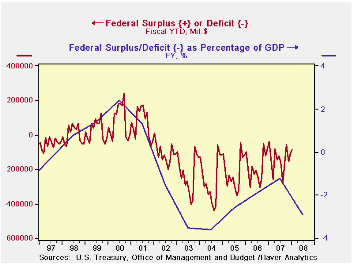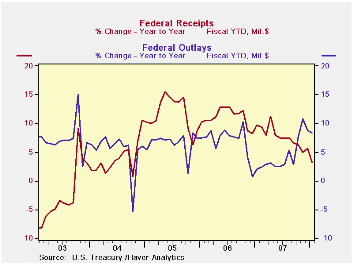 Global| Feb 19 2008
Global| Feb 19 2008U.S. Budget Deficit Deeper: A Weaker Economy
by:Tom Moeller
|in:Economy in Brief
Summary
The U.S. government ran a budget surplus last month of $17.8B. The news did not, however, represent real improvement in the government's budget condition. The surplus shrank and was roughly half that during January of 2007 when a [...]

The U.S. government ran a budget surplus last month of $17.8B. The news did not, however, represent real improvement in the government's budget condition. The surplus shrank and was roughly half that during January of 2007 when a surplus of $38.2B. Typically a surplus is run during the month of January.
The shrinkage of the January surplus highlights a worsening of the budget condition. For the first four months of FY08 the government's budget deficit of $87.7B was roughly double the $42.2B during the first four months of FY07. The deterioration in the dollar value of the deficit highlights the projected deterioration as a percentage of the nominal value of GDP.
For the fiscal year to date, growth in federal receipts slowed to 3.3% which was one third the growth during the first four months of FY07. The weaker economy with its slower employment growth brought slower growth in individual income tax receipts (44% of total receipts); to 4.2% from 12.6%. Withheld income taxes grew 4.4%, a sharp slowdown from 11.2% last fiscal year, but the weaker stock market brought a more dramatic drop in the growth in non-withheld taxes; to 4.8% from 21.9% during the four months of FY07.
Corporate income taxes (13% of total receipts) fell 2.5% as a result of the weakness in corporate profits. During FY07 they rose 16.4% during the first four months. Growth in employment & general retirement contributions actually rose slightly to 5.8% from 4.0% but unemployment insurance receipts fell 6.0%, nearly twice the rate of decline in early FY07.
U.S. net outlays grew 8.3%, well up from FY07 but steady with prior years. Growth in defense spending (19% of total outlays) of 9.6% was roughly steady and Medicare expenditures (12% of outlays) fell 3.0%. Growth in social security spending (21% of outlays) held about steady at 5.7% but interest expense grew 20.3% with the rise in interest rates.
The Government's financial data is available in Haver's USECON database.
The Federal Reserve's Tools for Responding to Financial Disruptions is Friday's speech made by Federal Reserve Board Governor Frederic S. Mishkin and it can be found here .
| US Government Finance | January | December | Y/Y | FY 2007 | FY 2006 | FY 2005 |
|---|---|---|---|---|---|---|
| Budget Balance | $17.839B | $48.261B | $38.236B (1/07) |
-$162.8B | -$248.2B | -$318.7B |
| Net Revenues | $255.2B | $277.0B | -2.1% | 6.7% | 11.8% | 14.1% |
| Net Outlays | $237.4B | $228.7B | 6.7% | 2.8% | 7.4% | 7.6% |
Tom Moeller
AuthorMore in Author Profile »Prior to joining Haver Analytics in 2000, Mr. Moeller worked as the Economist at Chancellor Capital Management from 1985 to 1999. There, he developed comprehensive economic forecasts and interpreted economic data for equity and fixed income portfolio managers. Also at Chancellor, Mr. Moeller worked as an equity analyst and was responsible for researching and rating companies in the economically sensitive automobile and housing industries for investment in Chancellor’s equity portfolio. Prior to joining Chancellor, Mr. Moeller was an Economist at Citibank from 1979 to 1984. He also analyzed pricing behavior in the metals industry for the Council on Wage and Price Stability in Washington, D.C. In 1999, Mr. Moeller received the award for most accurate forecast from the Forecasters' Club of New York. From 1990 to 1992 he was President of the New York Association for Business Economists. Mr. Moeller earned an M.B.A. in Finance from Fordham University, where he graduated in 1987. He holds a Bachelor of Arts in Economics from George Washington University.
More Economy in Brief
 Global| Feb 05 2026
Global| Feb 05 2026Charts of the Week: Balanced Policy, Resilient Data and AI Narratives
by:Andrew Cates






